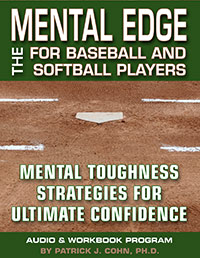
How to Take Charge of Your Emotions
What role do emotions play when you are on the field? And do you play better when you are amped up or relaxed?
Peak performance lies on a sliding scale. Peak performance depends on the player and the circumstances. Playing at your peak requires that you control your emotions and find your ideal emotional state.
While you are home during the coronavirus pandemic, you have the opportunity to explore how emotions affect performance.
One baseball pitcher from our Softball & Baseball Mental Toughness Survey posed this question:
“I’m a freshman pitcher in college. What is the best mental state on the mound? Sometimes, I get anxious on the mound and find it difficult to concentrate. Other times, I feel way too relaxed and can’t find my groove.”
As you recognized, emotions can influence your performance during games.
When you are too hyped, you will be anxious on the field. When you are in the playoff hunt late in the season, being amped up can interfere with your ability to throw strikes.
Every pitch that misses the strike zone seems to increase the pressure you feel, further adding to your anxiety level. You become more and more focused on the outcome of each pitch and the outcome of the game.
You feel tense and uneasy on the mound, gripping the ball tighter and slightly changing your release point. Your command on the mound is shot.
When you are too relaxed, you might feel sluggish on the mound. You don’t attack the hitters nor do you have movement on your pitches. You get lit up on the mound and just can’t get into the rhythm of the game.
Emotions are personal to each ball player and play a huge part in peak performance. Even though players know that their emotional state is important, most athletes do not pay attention to their emotional level before a game.
You cannot leave your emotional state to chance. Leaving emotions unchecked leads to inconsistent play on the field.
To be at your best, it is necessary to know which emotions are the most productive for you and how to manage your emotions through a game.
Junior pitcher Emerson Hancock from the University of Georgia credits his success to being emotionally prepared prior to games.
Hancock, who is ranked No. 4 on MLB Pipeline’s Top 200 Draft Prospects list, looks to achieve emotional balance while on the mound.
HANCOCK: “My dad always told me when I was younger you’ve got to be the calmest player on the field, being the pitcher… But at the same time, there’s a competitive and a fiery side that you have. You want to win. And so I’ve kind of had to walk that fine line, between being under control but also being locked in, being ready, being focused for every pitch.”
When you achieve emotional control, the moment never gets too big for you… You will feel ready to go and confident in your ability to play regardless of the situation.
Emotional Balance on the Field
Emotional balance requires 3 steps:
1. Know which emotions help or hurt your performance.
2. Know what circumstances precede emotions that enhance your play or hurt it.
3. Use specific strategies to calm you down (deep breathing, refocusing) and energize you (pump-up music or self-pep talk).
Take charge of your emotions and you will improve the consistency of your performance.
Related Sports Psychology Articles
- How to Manage Thoughts and Emotions in Meaningful Games
- How Emotions Control you on the Diamond
- Matt Garza: Controlling Game Time Emotions
*Subscribe to The Sports Psychology Podcast on iTunes
*Subscribe to The Sports Psychology Podcast on Spotify
Get The Mental Edge for Baseball and Softball
If you have trouble taking your practice game to competition and under perform in games, your mental game might be the culprit! Baseball and softball players contact me everyday wanting to know why they become scared, anxious, afraid to make mistakes, and lack trust in their skills during games…
You might have a ton of physical talent and perform great in practice, but if you can’t get the job done when it counts, something is missing and the problem is an inferior mental game–not talent or motivation.
We’ve spent the last six months developing a program to teach you how to improve your mental game in 8 easy-to-apply lessons–the same TOP lessons that I teach to baseball and softball players everyday in my one-on-one mental coaching program!

